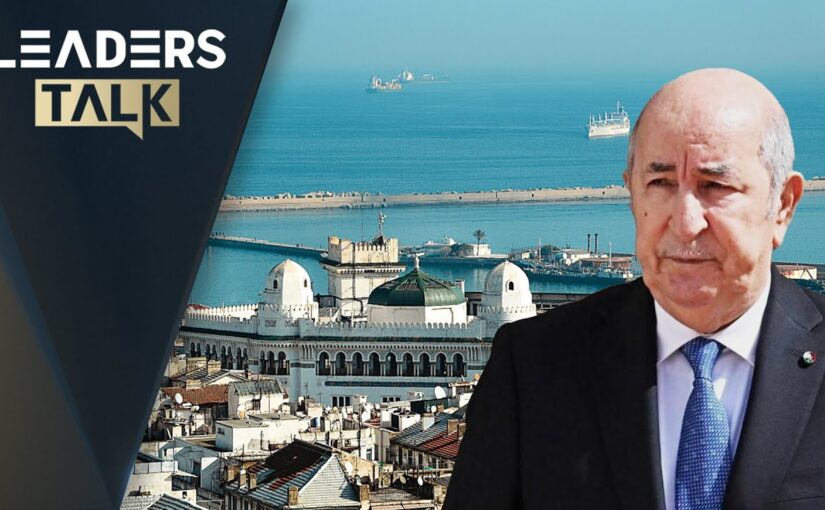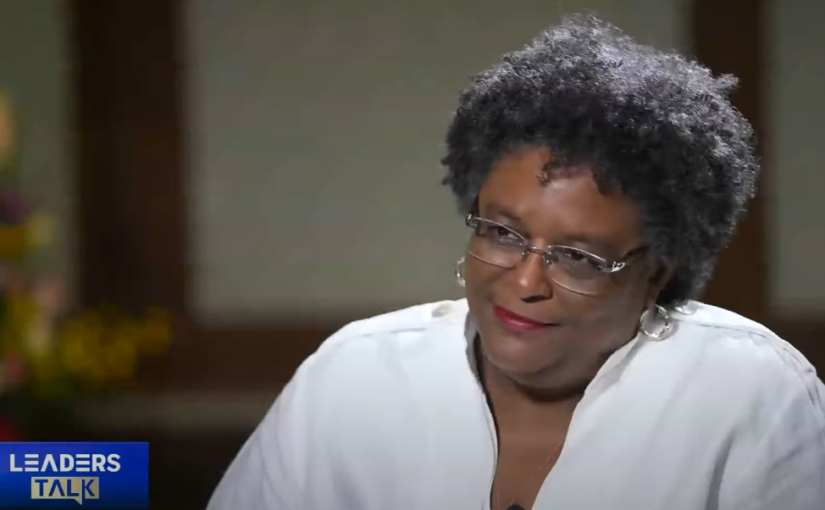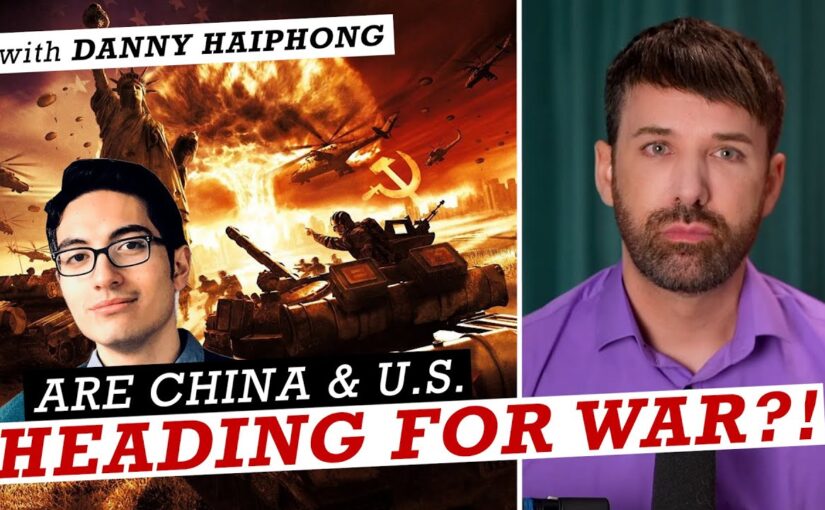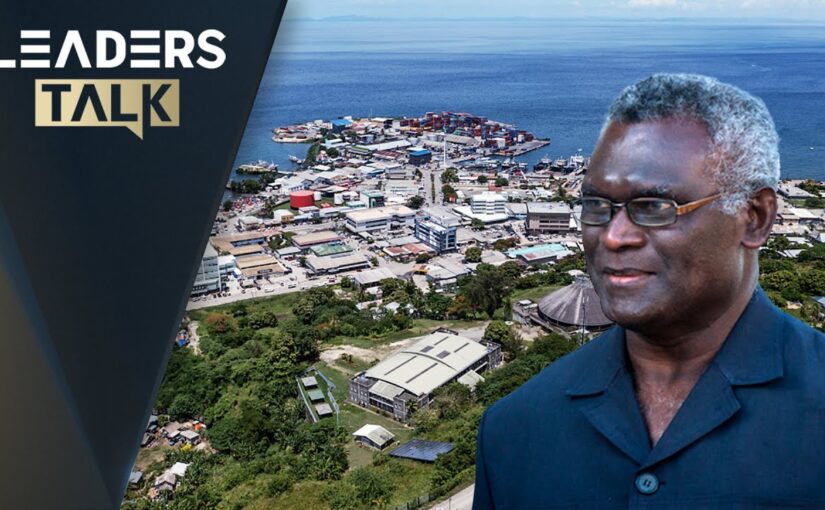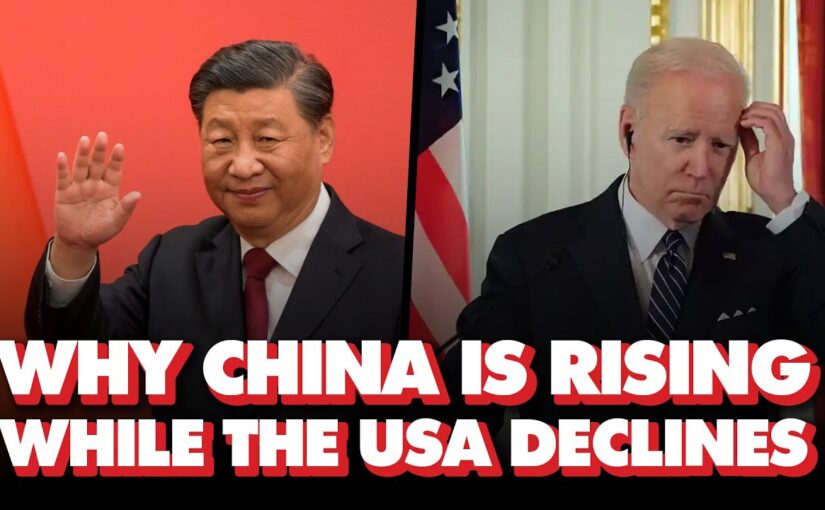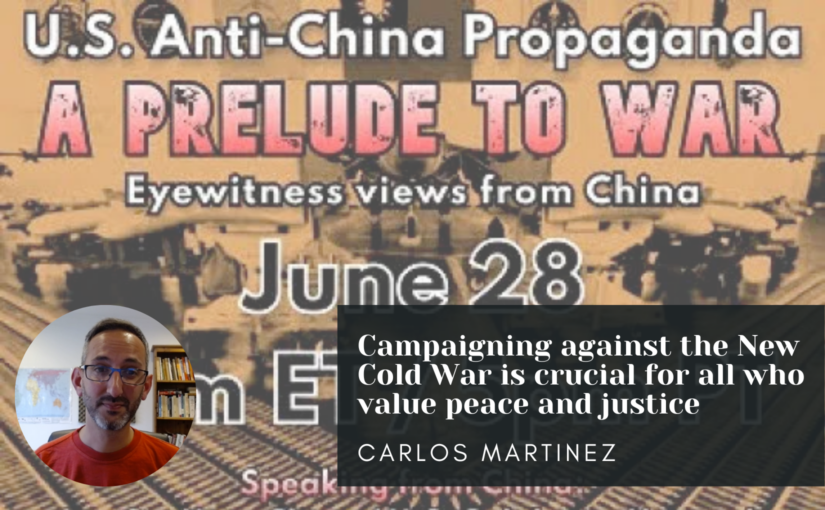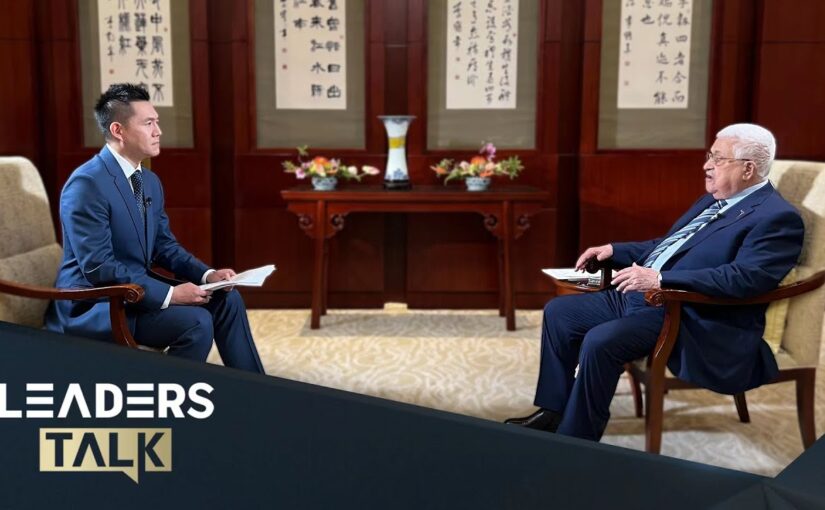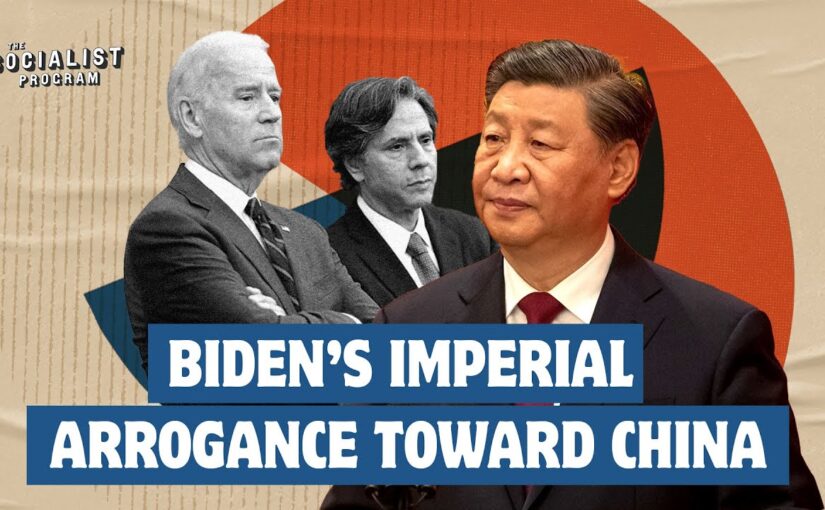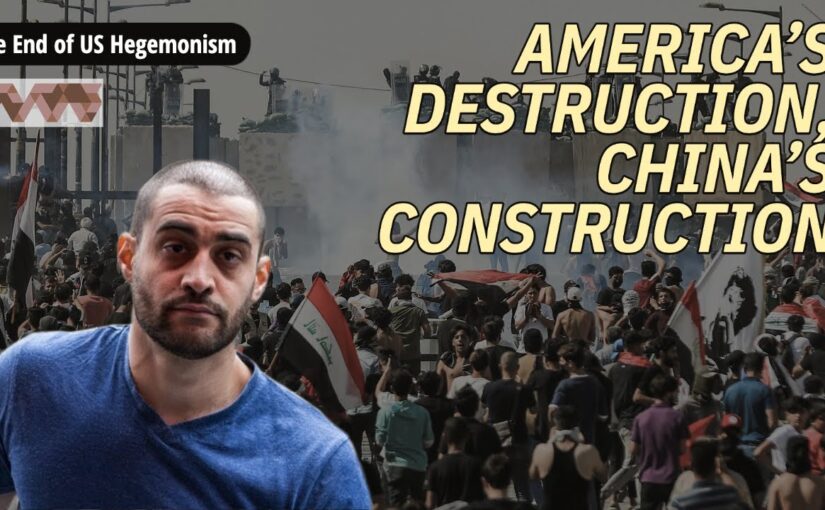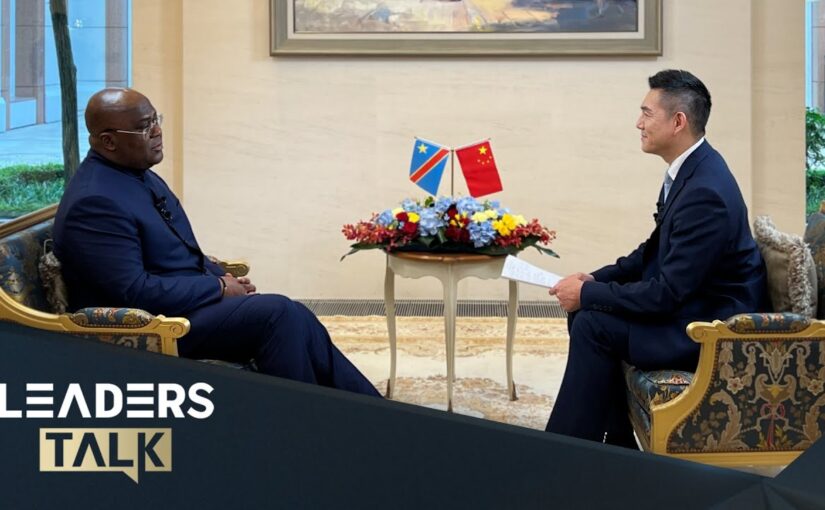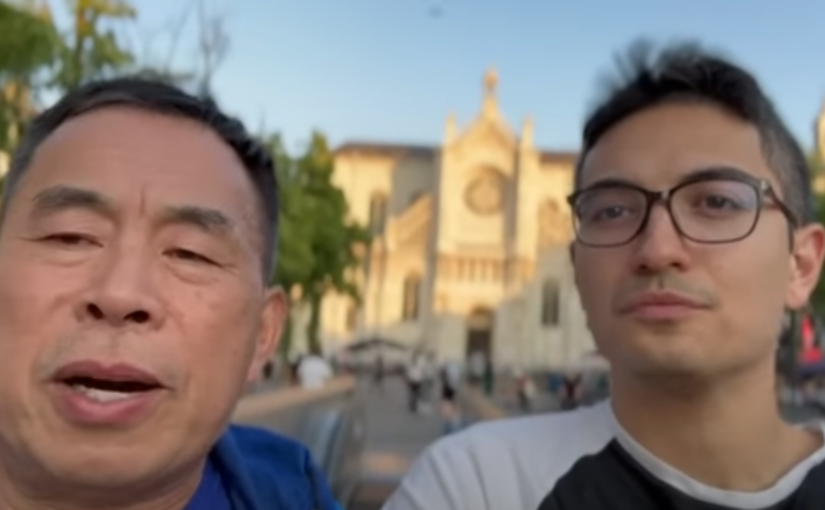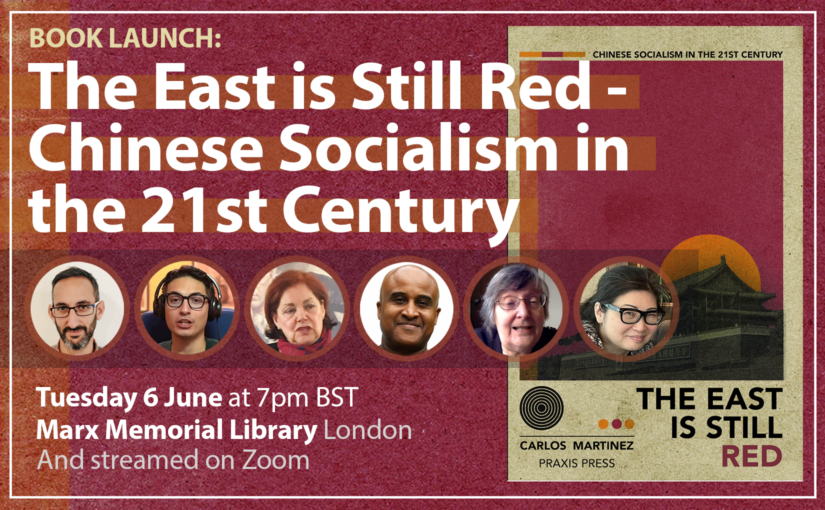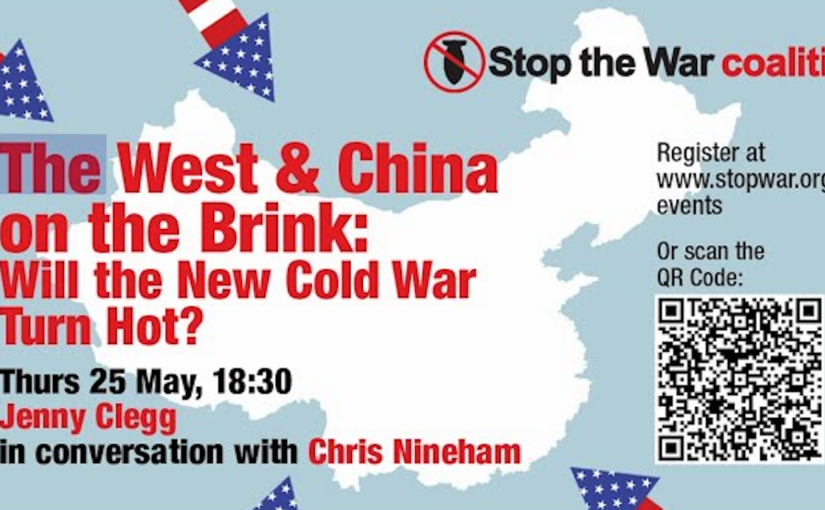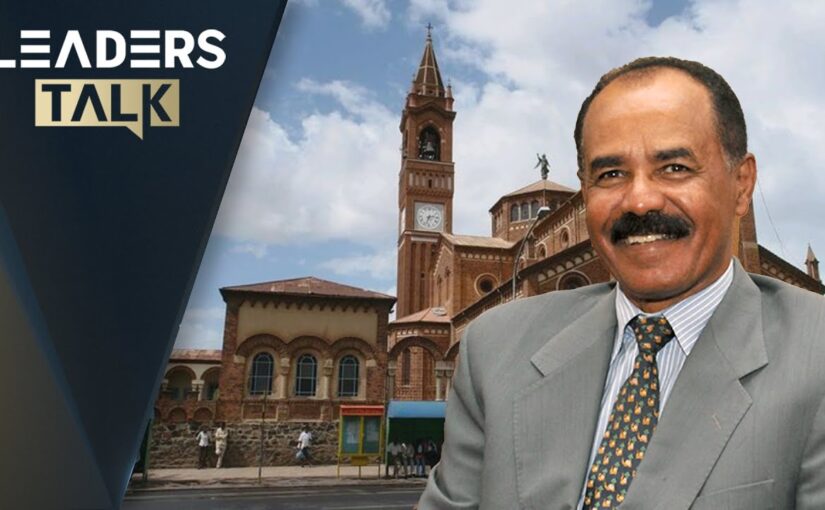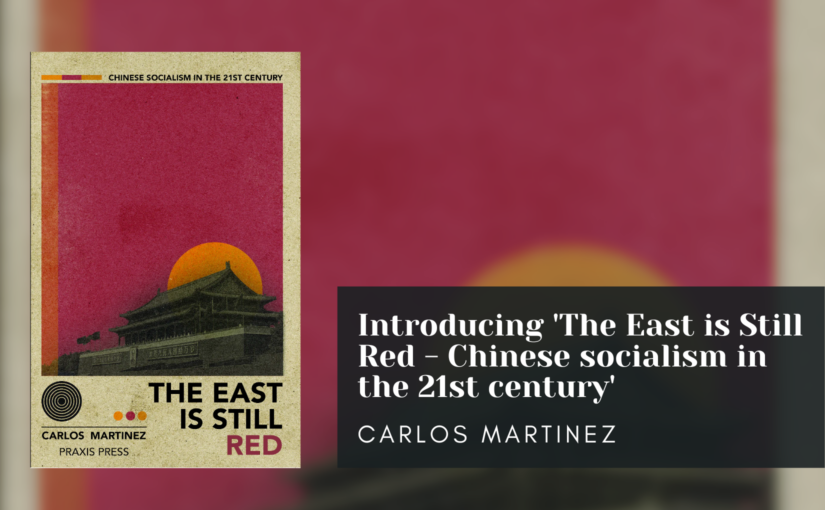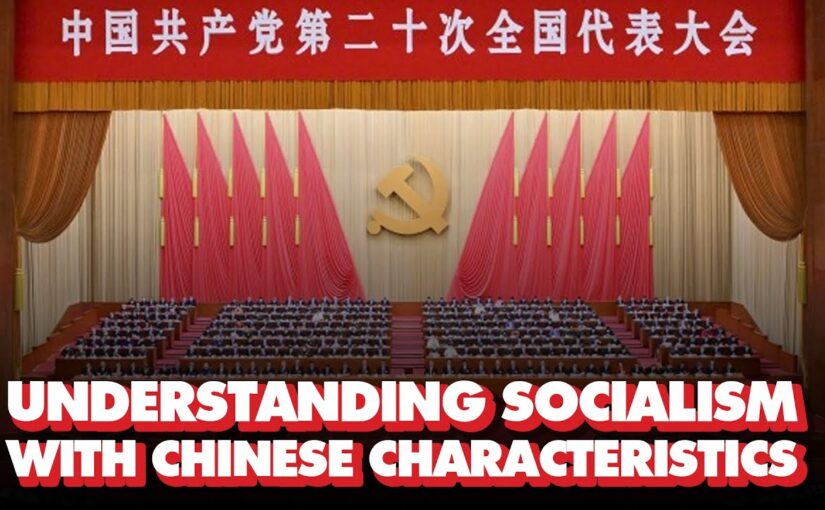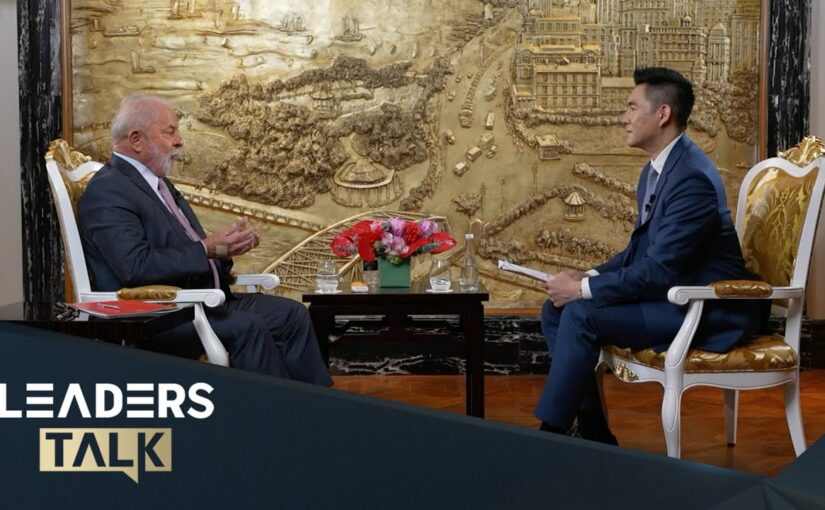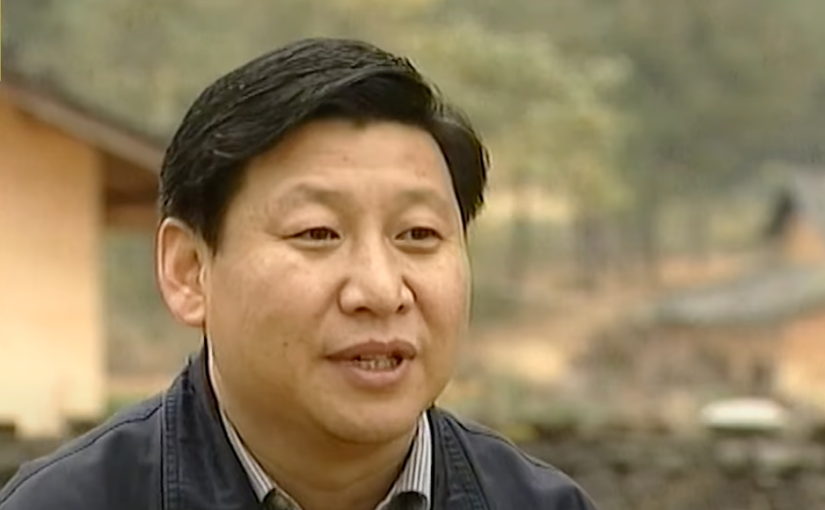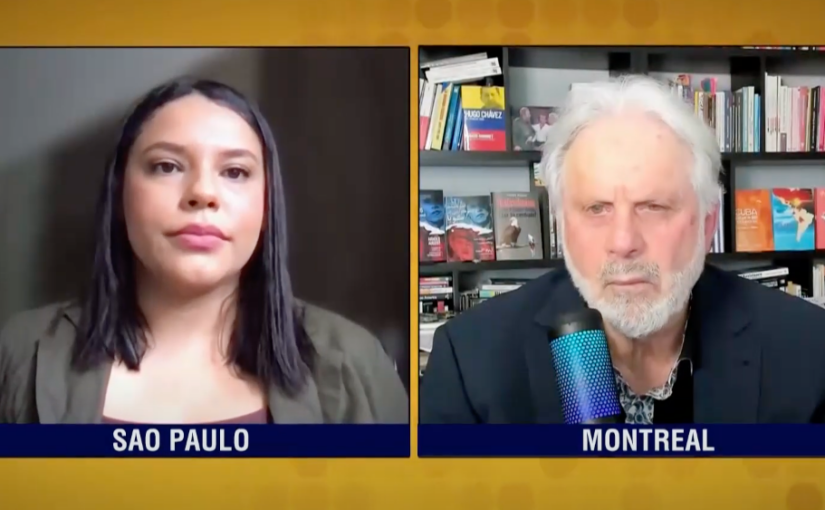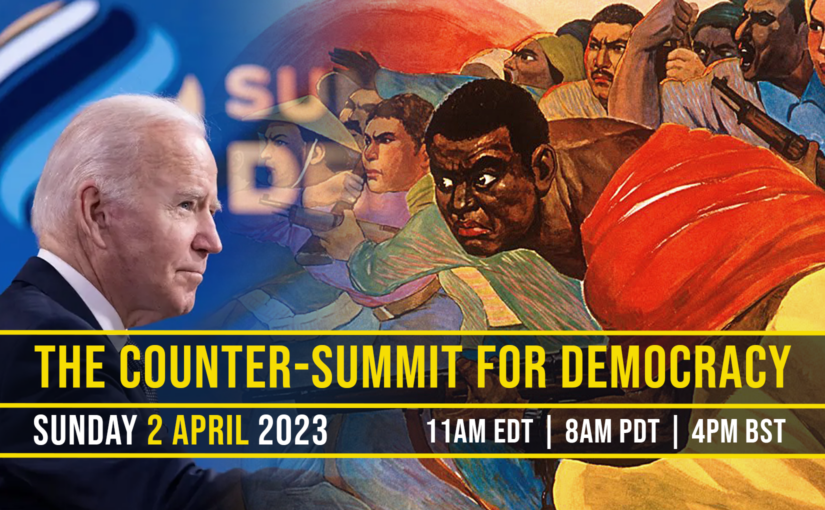Algerian President Abdelmadjid Tebboune paid a state visit to China, from July 17-21 2023. During this visit, shortly after his meeting with President Xi Jinping, he sat down with CGTN’s Li Tongtong to record an episode of the channel’s Leaders Talk series.
The Algerian leader began by expressing his people’s “sincere admiration for the great nation of China.” Algeria and China, he noted, share a similar history of development. Both of them started from scratch. Algeria endured 130 years of colonialism, but friendly countries like China helped both during the struggle for national liberation and when embarking on the road of development.
Li Tongtong noted the emotional way in which Xi Jinping had recalled how the two countries had stood together against imperialism and colonialism.
China was the first non-Arab country to recognise the Algerian provisional government, 65 years ago, at the height of the liberation war. China’s very first overseas medical team was sent to Algeria in 1963 – they were the first foreign doctors to reach the newly liberated country, which was then in dire need of medical assistance. In 1971, together with Albania, Algeria was the key sponsor of UN Resolution 2758, which restored China’s UN seat to its legitimate government.
President Tebboune said that China and Algeria had shared the same experiences. China had suffered from war, poverty and famine, but the indomitable Chinese people, under the leadership of revolutionaries like Chairman Mao Zedong, had fought hard for a better future and now China stands tall in the world.
Beijing’s action, in recognising the Algerian provisional government, he continued, had helped his country to win a complete victory in the war of liberation, and to embark on a new journey hand in hand with friends like China.
President Tebboune expressed great confidence in Xi Jinping, who he described as a wise leader. The weight on his shoulders is immense. China’s new path of development has implications for the whole world and many countries are looking to China. Algeria wholeheartedly supports him.
Algeria, which was the first Arab country to enter into a comprehensive strategic partnership with China, and which joined the Belt and Road Initiative (BRI) in 2018, is seeking to deepen its economic cooperation with China, which has long been its main partner in infrastructure development and other areas. One plan is for a railway to link the north and south of this vast country. Algeria’s first satellite, itself the first product of Sino-Algerian aerospace collaboration, is proudly featured on an Algerian banknote.
According to President Tebboune: “True friends step forward in times of adversity. So we are very clear about who our friends are and who are not. No matter how the world changes or what difficulties we face, our friendship with China will remain unchanged.”
Algeria, he noted, explaining the basis of his country’s regional and foreign policy, had struggled for national liberation, justice and freedom, and this had entered deep into the Algerian people’s subconscious. The Algerian people had paid a heavy price for these ideals. Fifteen percent of the total population at the time had sacrificed their lives in the national liberation war. So Algeria is very clear – it supports national liberation and rejects hegemonism of any kind. Some powers were now pursuing attempts at neo-colonialism, but the African peoples, he said, have awakened.
Referring to last November’s reconciliation agreement between 14 Palestinian factions, including Fatah and Hamas, which was brokered in Algiers with his country’s mediation, President Tebboune said Algeria pursued no selfish interest in this. Palestine’s strength lies in unity. The older generation of his country’s leaders had said that Algeria’s independence would be incomplete without the independence of Palestine and his country always adhered to this.
Algeria is striving for a multipolar world together with China and looked forward to joining the BRICS cooperation mechanism and its New Development Bank.
The full interview with President Tebboune is embedded below. Our previous report on his state visit to China can be read here.
Category: Video
Mia Mottley: China and Barbados share a commitment to putting people first
In this recent episode of the CGTN series Leaders Talk, Zou Yun interviews Mia Mottley, the first woman Prime Minister of Barbados, during her official visit to China in June.
Comparing what she has seen in China this time to her previous visits in 2004 and 2007, Prime Minister Mottley refers to the palpable changes in terms of China’s growth. This growth has continued to fuel the global economy despite recent challenges. She cites climate change as one of the challenges that “unite us in common purpose”. Small island developing states, the Barbadian PM notes, are on the frontline in the fight against climate change. They are the “canaries in the mine” and the world might have seen quicker action had people listened to their concerns.
Zou Yun notes that Mottley has a special bond with China in that she shares an October 1st birthday with the People’s Republic of China. Barbados, the Prime Minister notes, established diplomatic relations with China 46 years ago as an act of courage and on the premise that China and the Chinese culture and civilization are worthy of respect. Noting that a commitment to putting people first is a foundation of the two countries’ relationship, she praises China for its adherence to the principle of equality between big and small nations. An example was the response to the Covid-19 pandemic. Many countries had refused to provide vaccines to countries like Barbados on the grounds that their market share was too small, but China had provided her country with 30,000 doses of vaccine. She had personally gone to the airport to receive the first batch.
When some countries had criticized Barbados’ strong relationship with China, she had retorted that since independence, her country had resolved, under successive governments, formed by different political parties, to be, “friends of all, satellites of none.” This had dictated Barbados’ recognition of China in 1977 and also its friendship with Cuba and Venezuela.
In 2021, Barbados had become the world’s newest republic, removing the late Queen Elizabeth II as head of state. Mia Mottley describes this as being about finishing the journey of independence – which started with the emancipation from slavery in 1838, continued with women gaining the vote in 1944, independence in 1966, and removing the UK’s Privy Council as the final court of appeal in 2005. A non-Barbadian head of state, she explained, was no longer acceptable to our people. This was about “the business of nation building” and overcoming the legacy of racism that was intrinsic to British colonialism.
Moving to the conclusion of the interview, Prime Minister Mottley described her mission as being to improve people’s lives and to fight injustice. It cannot just be that the market determines that the victors should live well. The levelling hand of the state is also needed to bring as many people as possible to development.
The full interview with the Barbados Prime Minister is embedded below.
Video: Are China and the US heading for war?
Co-editor of Friends of Socialist China Danny Haiphong joined Andy Boreham of Reports on China to discuss the likelihood of war between China and the US following remarks by Hungarian Prime Minister Viktor Orban referencing the dangers of such an outcome.
Solomon Islands PM: establishing relations with China one of the best decisions in our history
In this episode of the CGTN series Leaders Talk, Zou Yun interviews the Prime Minister of Solomon Islands Manasseh Sogavare at the start of his second official visit to China in July. Sogavare came to China nearly four years after his previous visit, which marked the establishment of diplomatic relations between the two countries. This time, he officially opened his country’s embassy in Beijing and the two countries formally established a Comprehensive Strategic Partnership of Mutual Respect and Common Development in the New Era. When asked how he felt to be visiting China again, he simply says: “It’s good to be back home.”
Solomon Islands finally won independence from British colonial rule in 1978, but Sogavare repeatedly describes the decades between the proclamation of independence and the establishment of diplomatic relations with China as ones of “wandering in the wilderness”. This strikingly biblical phrase doubtlessly reflects his own Seventh Day Adventist faith, as well as the deep religious sentiments of the Solomon Islands people as a whole, and therefore, in turn, his deep attachment to the China relationship, which, despite being just under four years old, has been on the fast track to become a model of solidarity, cooperation and joint development between large and small countries and between developing countries. For Sogavare, the establishment of diplomatic relations was one of the best decisions made in his country’s history and he praises the attitude he ascribes to President Xi Jinping that, “no country is too small; no one comes too late.”
In the very short history of diplomatic relations between his country and China, Sogavare asserts that the achievements have been huge, not least China’s provision of the national stadium, where Solomon Islands will host the Pacific Games this year. He expresses himself vehemently with regard to those countries who have criticised his relations with China, saying that, “we are a sovereign state and who we have diplomatic relations with and who we develop cooperation with is no one’s business.” He dismisses the theory of a ‘Chinese debt trap’ as “nonsense”, saying that some countries are afraid that they are losing their grip over the small island states.
Establishing relations with China was the best decision because his country is struggling for development. Decades after independence, Solomon Islands is still aid dependent and the country is still poor, despite its immense resources and potential, including in forestry, marine resources, minerals and tourist attractions. Unless his country realigned itself to open up to the opportunities provided by China, he feared it would remain poor forever. Asked about his impressions of President Xi Jinping, he singles out his leadership in lifting the Chinese people out of poverty. This does not simply happen by chance and is something that other countries should emulate.
As the leader of a Pacific Island country, and home to some of the world’s greatest diversity of corals and coral reef species, Sogavare expressed serious and grave concern with regard to both the Japanese plan to release contaminated water from the Fukushima nuclear reactor into the ocean and the AUKUS agreement between Australia, the UK and the US that will see the introduction of nuclear powered submarines into the South Pacific. The South Pacific countries had jointly sent the Prime Minister of Cook Islands to Japan to convey their concern.
Regarding the AUKUS agreement, he explained that the first he had heard of this was on the media – the countries concerned had not even had the courtesy to inform Solomon Islands. This is despite the fact that both Australia and Solomon Islands are signatories to the 1986 South Pacific Nuclear Free Zone Treaty, also known as the Treaty of Rarotonga. The South Pacific, he says, is very clear on its nuclear free policy, citing the impact of the nuclear tests on Moruroa (a part of Polynesia still under French colonial rule) and the continued suffering of the people there.
Finally, Prime Minister Sogavare speaks of his personal admiration for the Chinese martial arts icon Bruce Lee. Himself a Second Dan (black belt) in the Japanese Shotokan school of karate, it was Bruce Lee who inspired him to take up the martial arts seriously and the Prime Minister recalls how meaningful it was for him to visit Lee’s Hong Kong home in 1997.
The full interview with Prime Minister Manasseh Sogavare is embedded below.
How China became the world’s industrial superpower – and why the US is desperate to stop it
In this detailed and informative video explainer on Geopolitical Economy Report, Ben Norton discusses China’s extraordinary rise and the economic dynamics of the New Cold War.
Ben notes that in 1950, China represented just 5 percent of global GDP. In purchasing power parity (PPP) terms, it currently represents 19 percent of global GDP, compared to 15 percent for the US. No other country in history has undergone such a dramatic transformation in so short a period. Ben makes the critically important point that this progress is the result of socialist, not capitalist, economics. He notes that in China’s socialist market economy, the commanding heights, including finance, infrastructure, transport and energy, are run by the state, and that the state continues to guide the economy overall, via five-year plans and multiple other mechanisms. China’s strategy has succeeded in transforming an overwhelmingly agrarian country into a leading industrial power, thereby creating the resources needed to develop more advanced socialism.
China’s rapid industrialization has led to it becoming the world’s largest manufacturer, and a leading innovator in advanced industry. This has some important – and contradictory – consequences for the West. Firstly, the West – and particularly the US – has been deindustrializing while China has been industrializing, and it now finds itself in a position where it is unable to outcompete China in terms of industrial innovation. This leads the US towards notions of ‘decoupling’ and trying to engage in various forms of economic coercion to suppress China’s rise. Secondly, however, China has become the global manufacturing center, and its high levels of productivity and innovation make it integral to multiple crucial value chains. As such, Western companies tend to be unwilling to ‘decouple’ or divest from China.
These competing needs are fomenting divisions within the Western ruling classes and are leading to decidedly incoherent foreign policy in Washington, London and elsewhere. The US is intent on preventing China from continuing to develop and becoming the world’s foremost economy, and yet the US’s financialized capitalism lacks the means to compete with (or indeed decouple from) China.
Campaigning against the New Cold War is crucial for all who value peace and justice
We are pleased to publish below the video and speech of a presentation made by Friends of Socialist China co-editor Carlos Martinez at a 28 June webinar of the United National Anti-War Coalition, on the theme of US anti-China propaganda, a prelude to war. Carlos exposes the extraordinary hypocrisy and falsehood of the propaganda war that the Western powers are waging against China, and highlights how it is being leveraged to shift public opinion in favor of anti-China hostility.
He points out that the escalating campaign of China encirclement and containment is threatening to derail global progress on key issues, noting that “the future of humanity actually hinges on global cooperation to address our collective problems.” As such, Carlos calls on all progressive and peace-loving people to make campaigning against the New Cold War a core part of their work.
Other speakers at the event included Lee Siu Hin of the China-US Solidarity Network, Sara Flounders of the International Action Center, and Arjae Red of Workers World Party. The full webinar can be viewed on YouTube.
Dear friends, thank you so much for inviting me to speak at this important event. I’m very sorry not to be able to join you in person, as I’m currently in Guiyang, China, on a delegation.
The theme of today’s event, “Anti-Chinese propaganda, a prelude to war”, is closely connected to the rationale for writing my book, “The East is Still Red: Chinese socialism in the 21st century.”
I had two key aims in mind with the book.
One was to talk about socialism, about how China is a socialist country. So many people think that China used to be a socialist country and then became capitalist with the introduction of market reforms. I wanted to show that China remains a socialist country and that socialism provides the framework for its incredible successes in poverty alleviation, development, renewable energy, and so on.
And I wanted to say to the Western left – which tends to be a bit unsure about China – look, China’s achieved all these things, it’s raised living standards beyond recognition, it’s gone from being a technologically backward and oppressed country to being a science and tech powerhouse, it’s leading the global shift to multipolarity; why on earth would we want to ascribe these successes to capitalism rather than socialism? Let’s celebrate socialist victories, let’s uphold the history and politics of the global working class.
Hence ‘The East is Still Red’.
The second key aim in writing the book was to stand up to the propaganda war, which is part of a wider New Cold War against China, and that’s the focus of my talk today.
This work of standing up to the propaganda war is urgent. It needs to be a major focus for socialists, communists, progressives, for anti-war campaigners worldwide; really for anyone that doesn’t think “better dead than red” is a viable slogan for the 21st century.
Because the propaganda war is war propaganda.
It seeks to build the broadest possible public support for a New Cold War, for a campaign of containment and encirclement, and ultimately very possibly for a hot war.
Let’s get something straight. This New Cold War, this anti-China campaign, has absolutely nothing to do with human rights.
When the West throws disgraceful slanders at China over alleged human rights abuses in Xinjiang, does anybody seriously think they’re manifesting a hitherto secret fondness and respect for Muslim people and their religion?
Where was that sentiment when they killed over a million people in Iraq?
Where was that sentiment when they destroyed Afghanistan, turning a quarter of its population into refugees and imposing brutal poverty on the rest?
Where was that sentiment when they bombed Libya into the Stone Age?
Where’s that sentiment today as they wage a disastrous proxy war against Iran in Yemen, creating the most severe humanitarian crisis in the world?
If they’re concerned about Muslims being placed in prison camps and denied their human rights, the first place they need to look is their illegally occupied corner of Cuba, that is, Guantanamo Bay.
When the West spreads outright lies about the suppression of Tibetan or Inner Mongolian language and culture, does anyone seriously think they’re standing up for the rights of indigenous peoples and for the preservation of precious human history?
How many indigenous languages are taught in US schools? To what extent is indigenous culture – and righteous resistance against colonialism – celebrated in US society? When was the last time native rights were upheld over drilling rights? Why does the US Congress seem more concerned with preserving Tibetan heritage than shutting down the Dakota Access pipeline?
These anti-China stories – all of which can be and have been comprehensively debunked – have nothing to do with upholding the principles of freedom, democracy and justice.
Continue reading Campaigning against the New Cold War is crucial for all who value peace and justiceCGTN interview with Palestinian President Mahmoud Abbas
In this latest instalment of the CGTN series, Leaders Talk, Wang Guan interviews Palestinian President Mahmoud Abbas during his recent state visit to China.
Abbas says that that the upgrading of relations between China and Palestine to that of a strategic partnership this time is of great significance. It is a good fortune to the Palestinian people that China always firmly stands on their side and provides assistance to them. Agreements reached during this visit include major projects in economy, agriculture, sister city programs, and so on.
The Palestinian leader regards China’s brokering of reconciliation between Iran and Saudi Arabia, and the resulting steps to resolve other disputes, both long-standing and more recent, in the region, as a miracle, adding that all Arabs are pleased with China’s efforts.
In response to his interviewer’s observation that the Palestinian issue is at the heart of Middle Eastern politics, but no progress has been made in its resolution due to the unbalanced US position, Abbas notes that Israel has discussed a ‘two-state solution’ but not enacted it. The US, he explains, acts as a roadblock, with little interest in solving the Palestinian issue. However, the United States also once refused to recognise Nelson Mandela and supported the racist policy of apartheid in South Africa, but they eventually capitulated and changed their stance.
Asked for his impressions of Chinese leader Xi Jinping, Abbas described him as a dear friend, both to himself and to the Palestinian people – a man who keeps his promises and never resorts to empty talk. Palestine, he continued, stands with China on the Taiwan issue. “If any country opposes China, we will resolutely oppose them and firmly stand with China.”
At the age of 13, Abbas, together with his family, had to leave their home and become refugees in Syria at the time of the Palestinian Nakba in 1948. Abbas reflects: “Our land was seized by others and Palestinians were forced into displacement. Today we are still fighting to return to our homeland and establish an independent Palestinian state.” The Palestinian President, who has visited China a total of 13 times, five of them as state visits, says that one significant similarity between the Palestinian and Chinese peoples is their determination to tirelessly strive for their goals once they have resolved to do so.
The full interview with President Abbas is embedded below.
Blinken’s visit and Biden’s true colors: imperialist arrogance toward China
In this informative discussion on Breakthrough News, Brian Becker and Ken Hammond address the latest developments in US-China relations, in particular Antony Blinken’s visit to Beijing and Joe Biden’s labelling of Xi Jinping as a “dictator”.
The two note that there was some short-lived optimism following Blinken’s visit that there could genuinely be scope for improving US-China relations, which are currently at their lowest ebb in half a century. Blinken had a lengthy discussion with Chinese foreign minister Qin Gang, as well as meeting separately with President Xi and Wang Yi, China’s top diplomat. The Chinese Foreign Ministry reported that Wang Yi reiterated China’s baseline – and entirely reasonable – demands: “that the US stop playing up the so-called ‘China threat’, lift illegal unilateral sanctions against China, stop suppressing China’s scientific and technological advances, and not wantonly interfere in China’s internal affairs.” Blinken meanwhile asserted that the US is committed to “managing differences responsibly and cooperating in areas of common interests.”
However, Biden’s foolish comments about the so-called spy balloon incident, in which he referred to Xi Jinping as a “dictator”, almost immediately wiped out any goodwill resulting from the Blinken visit. Ken observes that Biden’s comment betrays the US administration’s profound hostility towards China, and its fear of China’s rise. This fear, combined with the continued need of US capitalism to engage economically with China, leads to erratic and confused statements and policies.
Brian points to certain parallels between the McCarthyism of the Cold War era and the New McCarthyism of the New Cold War, including a nasty, racist and deeply antidemocratic witch-hunt. He points out, however, that China’s integration into the global economy means that attacks on China also cause significant harm to the West. Furthermore, import restrictions on Chinese products such as solar panels lead to inflated prices for US consumers and are impeding meaningful climate action. As such, the New Cold War is damaging for ordinary people in the West.
Ken and Brian describe the US as being addicted to war, and observe that the propaganda war against China is part of a broader war drive. They call for a determined struggle against this propaganda war.
Professor Hammond’s new book, China’s Revolution and the Quest for a Socialist Future, is available on 1804 Books.
Lowkey contrasts US and Chinese policies on the Middle East
At an important webinar organized by the International Manifesto Group on The End of US Hegemonism in West Asia, British-Iraqi researcher, academic and musician Lowkey provided an extremely interesting comparison of US and Chinese policy in relation to the West Asian region.
Noting that the US war in Afghanistan has turned a quarter of Afghans into refugees and left over 70 percent of the remaining population in poverty, Lowkey pointed out that China is providing humanitarian assistance and major investment, including a proposed 10 billion dollar deal for access to lithium deposits.
The US-led war on Iraq has resulted in over a million deaths, and created cancer rates in Fallujah worse than those recorded in the aftermath of the bombing of Hiroshima. The US alliance dropped an average of 46 bombs a day for 20 years, displacing around 37 million people. Meanwhile China has signed a contract to build 8,000 schools in Iraq, and the Iraqi government is finding that China offers much fairer terms in relation to oil purchases.
Western sanctions on Iran have had a terrible impact on living standards, on employment levels, on the ability of the country’s health system to import medicines, and more. China, in contrast, has agreed to invest 400 billion dollars in Iran over 25 years. Furthermore, China’s diplomatic activity is helping Iran to undo some of the work the US has been doing for decades to isolate it. The rapprochement with Saudi Arabia, facilitated by China, brings about the possibility of peace in Yemen – the greatest humanitarian crisis of our time.
The Iran-Saudi rapprochement is an important boon for the Palestinian people, as is China’s increasing involvement in trying to bring about a lasting and fair solution to the Palestine question. Lowkey assessed that “China’s policies are directly having an effect on the ability of Palestinians to defend themselves from Israeli violence.”
The video of the speech is embedded below.
Interview with DR Congo President Felix Tshisekedi
President of the Democratic Republic of the Congo (DRC), Félix Tshisekedi, paid a state visit to China, from May 24-29, visiting Beijing, Shanghai, Shenzhen and Hong Kong. During his visit, President Tshisekedi was interviewed by Wang Guan for the CGTN series, Leaders Talk.
Noting that he had never visited China before, Tshisekedi congratulated the country on its achievements in modernization, pointing out that, in the late 1960s, China and Congo were at approximately the same level of economic development. The leap China has made, he continued, is impressive. The Chinese model is one that he would like to emulate and replicate in his own country.
Asked why he had made a point of laying a wreath at the Monument to the People’s Heroes and visiting the Museum of the Communist Party of China, Tshisekedi explained that there are notable parallels between the history of the two countries. They had both suffered from poverty and famine. But China has leveraged its strength and resources to escape from this legacy. Coming to China to see how this had been achieved was, he said, important to him. Regarding some of the negative things said about China by some international voices, he noted that to ensure the safety of more than one billion people, in terms of food security, education and health, is an enormous challenge. Rather than condemn China, he is inspired by its achievements and seeks to build a strong friendship.
Surveying some of the key areas of enhanced cooperation agreed during his visit, the President cited climate change, where the bilateral partnership could benefit the whole world, particularly with the DRC being the most biodiverse country in Africa.
He also laid strong emphasis on the need for the DRC to stop being purely an extractive site for its vast mineral wealth. By moving to refining, jobs would be created and development promoted. China, he explained, had agreed to join hands to promote the industrialisation of the DRC. Without added value, Tshisekedi asserts that Congo’s vast resources are virtually worthless in terms of the country’s development needs. The same could be said for its agricultural produce. Tshisekedi is grateful to China for its understanding and support, which is already producing tangible results, for example in terms of Chinese investment in battery manufacturing facilities that are crucial for renewable energy.
Development is a pressing need and for this peace and security are also needed. In Tshisekedi’s view, Xi Jinping’s concepts of the Global Development Initiative, Global Security Initiative and Global Civilization Initiative can all be of immense benefit to the DRC as well as to Africa as a whole. The DRC and Africa need China to stand alongside them in the search for peace and as a partner for development.
Moving to the end of the interview, President Tshisekedi struck an optimistic note. One day, he insisted, the DRC would achieve zero poverty. It is possible. China has done it.
The full interview with President Tshisekedi is embedded below.
Chen Weihua on the New Cold War, Taiwan and Ukraine
On the road in Brussels, Friends of Socialist China co-editor Danny Haiphong caught up with the prominent Chinese journalist Chen Weihua (China Daily’s EU bureau chief) for a very interesting interview.
Chen comments at length on the New Cold War and the deterioration in US-China relations during the Trump administration. Having worked in the US for several years during the Obama years, Chen witnessed a far healthier bilateral relationship, characterized mainly by cooperation – in spite of the launch of the Pivot to Asia, which obviously heralded a strategic shift on the part of the US. However, Trump dismantled the policy of engagement that had been in place since the restoration of relations between the two countries in the 1970s and, sadly, the Biden administration has been no improvement when it comes to US-China relations. Biden on the campaign trail criticized Trump’s trade war, but in office he’s continued and deepened it.
Regarding the Taiwan issue, Chen Weihua appealed to US politicians to not undermine the One China Principle or attempt to change the status quo over Taiwan. He stated that there is a consensus in China in favor of peaceful national reunification, and a general understanding that this process may take considerable time. For the US to encourage Taiwanese separatism and stoke the flames of conflict in the region is dangerous and ill-advised.
Video: ‘The East is Still Red’ launched in London
On Tuesday 6 June 2023, at Marx Memorial Library in London, we held a launch event for Carlos Martinez’s book The East is Still Red – Chinese socialism in the 21st century. Aside from Carlos, the meeting was addressed by Her Excellency Rocío Maneiro González (Venezuelan ambassador to the UK), Danny Haiphong, Roger McKenzie and Jenny Clegg, and was chaired by Iris Yau.
Carlos opened the session by discussing his purpose in writing the book. He stated that the two key motivations were: to oppose the propaganda war on China such that people’s consent isn’t manufactured for the West’s escalating campaign of containment and encirclement; and to contribute to building understanding of Chinese socialism. Describing China’s extraordinary achievements in the realms of poverty alleviation, green energy development, tackling Covid, and promoting a peaceful, multipolar world order, Carlos questioned why people on the left would want to ascribe such achievements to capitalism. In spite of the introduction of market elements to China’s economy, and its integration into global value chains, the working people led by the Communist Party maintain political power. This is the ‘secret’ of China’s incredible progress and the continuing improvement of people’s living standards.
Roger McKenzie, international editor of the Morning Star, discussed the racist ideology that forms a backdrop to the propaganda war on China and the West’s attempts to disrupt growing economic and political links between the countries of the Global South. Roger further talked about the inspiration the developing world is drawing from China – a country that has directed such massive resources towards improving people’s living standards, which is demonstrating in practice a clear alternative to ‘Washington Consensus’ neoliberalism.
Rocío Maneiro, who was Venezuela’s ambassador to China from 2004 until 2011, and who accompanied Hugo Chávez on his trips to China in that period, described living through a period in which the international balance of power shifted from West to East, principally due to the multipolar strategy promoted by China. Speaking as a representative of Venezuela – a country which continues to suffer due to the sanctions, destabilisation and coercion applied by the Western powers – Rocío stated that China’s international policy is based on equality, on win-win relations, on peaceful cooperation and a collective vision of a prosperous future for humanity. She concluded that, after reading The East is Still Red, “it is almost impossible to describe socialism as a failed political system.”
Danny Haiphong – a popular broadcaster, journalist and co-editor of Friends of Socialist China – focussed on the multipolar project which lies at the heart of China’s foreign policy. The US’s concern with China, Danny pointed out, is not simply about economic factors or the idea that China is becoming economically powerful; more fundamental is that China’s foreign policy – informed by its socialist political system – is offering the global majority a new and far more democratic model of international relations. The Belt and Road Initiative, the BRICS, the Shanghai Cooperation Organisation and other bodies are changing the landscape of international cooperation; are bringing rapid development to the Global South and allowing them to assert their sovereignty and pursue their own development model. This shift constitutes an existential threat to the US-led imperialist world system.
Speaking by Zoom, Jenny Clegg – a longstanding China expert, academic and peace activist – discussed the relentless sinophobic propaganda that accompanies the escalating New Cold War. This propaganda cuts people off from understanding not only China’s internal dynamics but the multipolar project that it pursues. Multipolarity is already opening up space for sovereign development and cooperation in the Global South, and indeed is opening up new paths to socialism, but people in the West find themselves unable to understand and engage with these processes. As long as this is the case, the Western left will continue to struggle to develop its own role in the global struggle against imperialism and for socialism.
The speeches were followed by a lively discussion and Q&A session.
The video stream of the event, hosted by Danny Haiphong, is embedded below.
The West & China on the brink: will the New Cold War turn hot?
Britain’s Stop the War Coalition organized an online lecture and discussion on the danger of the new cold war with China turning hot on May 25, 2023. Dr. Jenny Clegg, former senior lecturer in Asia Pacific Studies as well as an officer of Stop the War and a member of the Friends of Socialist China advisory group, made a presentation and then responded to questions, initially from Chris Nineham, Vice Chair of Stop the War, who chaired the event.
Jenny detailed the extensive militarization of the vast Pacific Ocean by the United States and other imperialist powers, not least with the US Pacific Command based in Hawaii, the US bases located in their colonial territories of Guam and the Northern Mariana Islands, as well as in South Korea, Okinawa and the Japanese mainland, and the recent agreements to regain access to bases in the Philippines and to establish a base in Papua New Guinea. Due to its colonial presence in the region, far from the US mainland, the Pacific waters claimed by the US dwarf those claimed by China. Britain claims about the same amount of the Pacific as China by virtue of its continued colonial possession of the Pitcairn Islands (combined land area of 18 square miles; permanent inhabitants as of January 2020, 47), whilst France also claims vast waters from its colonial occupation of New Caledonia.
According to Jenny, at the center of US strategy to maintain its domination of the Pacific today is a move to create an Asian NATO via a number of initiatives, including linking the AUKUS agreement, between Australia, Britain and the United States, to the upgrading of its military alliance with Japan, to forging new military agreements with the Philippines, and so on. Britain is also at the center of such moves, with, for example, its new military alliance with Japan, along with its central role in AUKUS.
The video embedded below, originally uploaded by Stop the War, features Jenny’s introductory talk, along with her response to questions posed by Chris Nineham.
Video interview with Eritrean President Isaias Afwerki
In this edition of the CGTN series Leaders Talk, Zou Yun interviews Eritrean President Isaias Afwerki during the latter’s recent state visit to China.
Speaking on the day after his talks with Chinese President Xi Jinping, and on the eve of the 30th anniversary of the counties’ diplomatic relations, which were established on the day that Eritrea proclaimed its independence, President Afwerki situated the bilateral relationship within what he described as the broader context of the historic mission of humanity. China had immediately stood on the side of the right of the Eritrean people to independence. Independence is the foundation of any international relationship. China, he said, stands on the side of the people of the world. And Eritrea, in solidarity with China, continues to uphold a mission for humanity.
The interview discussed the recent fallout from the conflict in Sudan, where Eritrea had assisted Chinese people who were being evacuated from the war-struck country, while China had also helped Eritrean people to leave Sudan. The Eritrean president described this as “our commitment to our common cause”. In words that should shame British government ministers, he described how Eritrea had opened its borders to refugees – “No visa. No permissions. Everything is open for saving human lives.”
There was a need, Afwerki said, to create a new world order. No people can survive without solidarity and what China has achieved, both domestically and internationally, is very attractive to people around the world.
Saying that the future is bright, the Eritrean leader was of the view that hegemonism “is no longer the rule of the game” because of what China has achieved.
Turning to the sanctions imposed on his country by the United States and some other countries, Afwerki described them as the product of a sick mind. Such sanctions, he said, are imposed on all those who defend their independence and sovereignty. Sanctions have inflicted tremendous damage on Eritrea and its development, but they have also taught a powerful lesson with regard to the struggle that needs to be waged to build a nation and have made the Eritrean people more determined to continue that struggle.
Zou Yun referred to President Afwerki as having a “special bond” with China. Over 50 years ago, at the age of 20, he came to China and spent two years in military and political training at the dawn of the Eritrean revolution. Questioned on this period, he said that he learned so much in a short time and what he had learned had changed lives. The main lesson, he said, was the commitment of the country’s leaders and the Communist Party to the people. This has provided a model of success for everyone. China had been considered a backward country by others, but now it is reshaping the global order.
The full interview with President Isaias Afwerki is embedded below.
Introducing ‘The East is Still Red – Chinese socialism in the 21st century’
Friends of Socialist China co-editor Carlos Martinez was interviewed by Sean Blackmon on the Sputnik Radio show By Any Means Necessary about his new book, The East is Still Red – Chinese socialism in the 21st century.
Carlos talks about his motivations for writing the book, the crucial importance of opposing the US-led New Cold War, the necessity for Marxists to understand and defend Chinese socialism, and the ever-contentious question of whether contemporary China is indeed socialist.
The full interview can be viewed on Rumble.
Find out more about the book | Buy the book | Join the book launch on 4 June 2023
Interview with Roland Boer on the nature of Chinese socialism
In this very interesting and detailed discussion, Roland Boer and Ben Norton delve into a number of the key issues from Roland’s book Socialism with Chinese Characteristics: A Guide for Foreigners. The core of the discussion is around answering the left critique of China’s post-1978 economic reforms: that these constitute a return to capitalism; that Deng Xiaoping and his colleagues were capitalist roaders who sought to overturn socialism via the introduction of market mechanisms.
Roland points out that markets go back thousands of years, long pre-dating capitalism. As such, there’s no equals sign between capitalism and markets; markets existed before capitalism and they can exist after capitalism. The question for socialists is how to use markets within a socialist context; how to use market mechanisms within a framework of an overall planned economy which is directed at meeting the immediate and long-term needs of the people, and preparing the ground for an eventual transition to a classless society.
Roland makes an important distinction between two key aspects of socialism: that of common ownership of the means of production, and liberation of the productive forces. The two do not necessarily always advance in neat and predictable correlation. This is something that is understood by all existing socialist societies – in China, Vietnam, Cuba, Laos and the DPRK. Deng Xiaoping and his colleagues understood very well that a high level of the productive forces was a material prerequisite for China’s development of an advanced socialism and ultimately for communism. The whole purpose of the reform process has been to develop China’s productive forces whilst simultaneously pursuing the fundamental socialist objective of improving people’s lives. On both counts, the process has been phenomenally successful.
Ben contrasts the level of development and living standards in India and China, noting that hundreds of millions in India continue to face devastating poverty, while China is responsible for at least 70 percent of all poverty alleviation in the last four decades. He points out that this disparity is primarily a manifestation of the two countries having different social systems.
The two take on a number of other key questions, including the nature of socialist democracy, the treatment of migrant workers, the household responsibility system, corruption, and the consolidation of Marxism in China under the leadership of President Xi Jinping.
The video was first posted on Ben’s Geopolitical Economy Report channel.
Lula: China has become a great power by seeking common development
We are very pleased to reproduce the latest episode of the CGTN series Leaders Talk, featuring Brazilian President, Luiz Inácio Lula da Silva.
President Lula spoke to CGTN’s Wang Guan on April 13 in Shanghai, at the start of his state visit to China, his fifth such visit and his first visit outside of the Americas since the start of his third presidential term on January 1. Whilst in Shanghai, Lula attended the inauguration of his successor as Brazilian President following his first two terms of office, and Workers’ Party (PT) comrade, Dilma Rousseff to head the New Development Bank (NDB), initiated by the BRICS grouping, becoming the first head of state to visit the bank, and also visited a research institute of the Chinese telecom company Huawei.
“The decision to create the NDB was a milestone in the joint action of emerging countries…The creation of this bank showed that the union of emerging countries is capable of generating relevant social and economic changes for the world,” Lula tweeted.
He went on to note that: “For the first time, a development bank with global reach was established without the participation of developed countries in its initial phase. It was free, therefore, from the shackles of conditionality imposed by traditional institutions on emerging economies.”
In his interview with Wang Guan, throughout which he spoke with the candour and passion that befits a lifelong militant and fighter for the working class, Lula said that the aim of his then upcoming talks with his friend President Xi Jinping was to establish a strategic partnership between their two countries that could last for decades and which could cover many areas, besides the economy and trade, including science, technology, education and cooperation in space.
He intended to build on the “extraordinary relationship” he had enjoyed with China during his first two terms. Referring to the significance of Dilma’s leadership of the NDB, he said that countries like Brazil and China did not need to trade in US dollars. They could use their own currencies or a unified one.
Explaining that the world had changed since 1945, Lula said that a new model of global governance was needed. To solve the Russia/Ukraine conflict, it was necessary to bring the countries that wanted peace together (what has elsewhere been described as a ‘peace club’), so that they could together come up with a proposal.
Fifty years ago, Lula continued, no one believed that China could become a great power. It had done so, not by inciting war, but by seeking common development. He was glad to see that China was investing in Africa and Latin America. In the wake of the 2008 Global Financial Crisis, everyone agreed that the developing countries were in need of investment, but no country had actually delivered on this except for China.
Lula said he finds it admirable that China has achieved high-speed, leapfrog development whilst maintaining its ideology and party building. Lifting hundreds of millions of people out of poverty is not an easy task. Brazil had eliminated hunger by 2012, but now it had returned (thanks to the disastrous far-right presidency of Jair Bolsonaro). Brazil therefore needed to learn from China in a serious, friendly and humble way. There is no need to copy everything, but neither should one deny everything.
Responding to his interviewer’s observation that Lula has a considerable following in China, the Brazilian leader spoke movingly about what motivated him. One of 12 children, eight of whom survived, he quit school to work as a street vendor at age 8 to help feed his family. “I will always remember where I come from. Being the president is not a profession. It is to represent the Brazilian people in exercising power. The reason I wanted to become the President of Brazil was to improve the lives of the poorest people. We must ensure that they have breakfast, lunch and dinner every day and jobs to support their families.”
The full interview is embedded below.
Xi Jinping: Life is about doing something meaningful for the people
“Serve the People” is the title of one of Mao Zedong’s most famous articles. And this simple phrase also goes to the heart of the style of work that the Communist Party of China seeks to promote.
This video, released by CGTN to coincide with Xi Jinping’s recent election to serve as the President of China for a third term, shows how the Chinese leader has practiced and come to personify this way of working since his early years.
It begins with his being sent, as a teenage ‘educated youth’, to the poor village of Liangjiahe in Shaanxi province. He rose to become the village party secretary and led the local people to take a whole series of innovative measures to boost food production. Yet he only ate white rice once in the whole of the seven years that he lived there.
The documentary follows the future national leader through his work in Zhengding, a poor area in Hebei province, where he started his political career and encouraged the development of rural research teams and of a semi-suburban economy, to Fujian, where he encouraged local people to become ‘sci-tech’ experts, and to his leadership of disaster relief work in Zhejiang.
Against this historical background, we also see the people’s leader going, in Lenin’s memorable words, “lower and deeper to the real masses” in all parts of the country. Particularly striking are his revisits to the places and people where and with whom he worked in the past. When the film culminates with him taking the oath of office of President last month, with clenched fist raised, one can well appreciate how this accords with the deeply-felt wish of the Chinese people from all ethnic groups.
The CGTN video is embedded below.
Video: China, Brazil move towards de-dollarizing trade
Brazilian President Lula’s widely anticipated visit to China has now been rescheduled for April 11-14, following his recovery from the influenza and pneumonia that forced a postponement. Whilst a number of bilateral agreements are due to be signed during that visit, a scheduled business seminar between the two countries went ahead as planned, already resulting in more than 20 agreements, most significantly regarding moves to de-dollarize Sino-Brazilian trade, in favour of a move to national currencies.
On Iran’s Press TV, Kaveh Taghavi was joined by Camila Escalante of Kawsachun News and Montreal-based author and journalist Arnold August to discuss the significance of this move, which, Camila notes, also coincides with the confirmation of the appointment of Dilma Rousseff, former Brazilian President and Lula’s Workers’ Party (PT) comrade, as President of the BRICS’ New Development Bank (NDB), headquartered in Shanghai, as well as the establishment of diplomatic relations between China and Honduras.
Arnold August situates these developments in the wider context of the loss of US hegemony and the growth of the BRICS, with an increasing number of developing countries seeking membership. He explains how the People’s Bank of China (PBOC) is able to work for the well-being of the Chinese people and people around the world, and cites the recent Beijing agreement between Iran and Saudi Arabia to repair their relations as another example of China’s increasing role in world affairs.
The video of their discussion is embedded below.
Videos: The Counter-Summit for Democracy
On 2 April 2023, Friends of Socialist China and the International Manifesto Group co-hosted a powerful and successful Counter-Summit for Democracy, a response to the US-sponsored so-called Summit for Democracy held a few days earlier.
The participants at this counter-summit exposed the hegemonic reality behind the US’s talk of a ‘rules-based world order’; explored alternative models of democracy; denounced US-led attempts at ‘decoupling’ and incitement of division; promoted an emerging multipolar, multilateral model of international relations; and called for for global cooperation to solve the vast problems collectively faced by humanity.
The videos from the event are embedded below.
